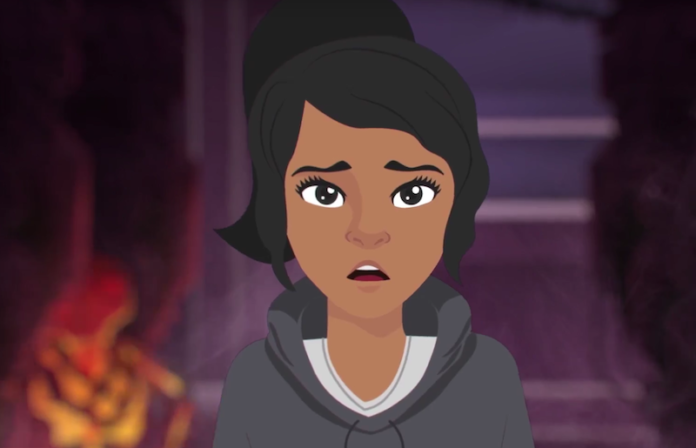Imagine that you’re sitting with a friend, they’re vaping, and suddenly they start to choke on the aerosol they’re inhaling. In an effort to save them, you go through a door that transports you to “smoke city,” an alternate reality where tobacco rules. From there, you have to complete a series of tasks and tests in order to find your friend, who’s still having a negative reaction to the vape. That’s the premise of ASPIRE (A Smoking Prevention Interactive Experience), a game developed to help educate young people on the impacts of tobacco and nicotine.
ASPIRE was developed by The University of Texas’ MD Anderson Cancer Center, and though it isn’t vaping-specific, the game tackles different kinds of tobacco and nicotine use — ranging from traditional cigarettes to vaping devices to hookah.
“ASPIRE is being used by youth ages 13 to 18 in 41 states across the U.S.,” said Giselle Montest, program manager of the department of behavioral sciences for the University of Texas’ MD Anderson Cancer Center. “Since January 2018, 31,376 have used the program with over 70 memorandum of understanding (MOU) agreements signed by several schools, districts and community organizations that work with adolescents.”
One of those is the Windsor Unified School District.
In Windsor, the program is available to students at Cali Calmecac, Windsor Middle School and Windsor High School. For WHS principal Stacy Desideri, the game is appealing because it demands more attention from students than other potential disciplinary action.
“So many of our responses are disciplinary and short term in response. If you’re going to make a change that’s going to impact something as challenging as nicotine addiction, a one-day consequence isn’t going to have an impact,” she said. “We’ve been wondering what sort of strategies could we do to have students do some sort of long-time commitment to change.”
One strategy involves giving them a chance to play through ASPIRE.
“It would be challenging to complete in one session,” Desideri said. As part of the gameplay, ASPIRE has you watch some short informational videos and interact with the game. To ensure that players are paying attention, players have to take quizzes before they can advance to the next level.
“You can’t just turn it on and watch some videos, or turn it on and play Candy Crush. You have to interact with it,” she continued. “(Students) actually have to commit over an extended period of time to thinking about what is the harm if I bring this into my life. I think this game has some potential because they don’t always see vaping as harmful.”
While ASPIRE is used in Windsor as an disciplinary program, the creator of the game said that his goal is to reduce smoking initiation as a whole.
“What we’re fighting here is addiction,” ASPIRE creator Dr. Alexandrew Prokhorov said. “We see hookah, e-cigarette … use as an addiction.”
Prokhorov added that many of the similar programs he’s seen only tackle one specific kind of nicotine use, such as smoking cigarettes, and that the folks at the MD Anderson Cancer Center “believe that single product programs aren’t as good as multiple product programs.”
ASPIRE was initially created in 2002, but has since been updated to include more devices and to appeal to today’s audience.
“The concept was to provide education in a fun, game-like format, so the videogame feel was prevalent in the design from the very beginning,” Prokhorov said. “With the new forms of tobacco and nicotnie (consumption), we needed to update the program to include new information.”
When they were looking to develop the new version that’s used by schools like WHS, deemed ASPIRE 2.0, Prokhorov said that they made a concentrated effort to develop a program that they could easily update as information changes.
Since adopting the game in early March, Desideri said that she’s had seven students opt to play it.
“We can’t force it,” she said, adding that it’s offered as a consequence if a student is in a situation where their actions warrant consequences.
“We offer them an opportunity to learn and grow in response,” she said. “If you share with students, ‘We want you to take some time to reflect until you’ve grown’ … students have all been receptive to it.”
One student recently finished the program and went back to Desideri with her thoughts. While the student admitted that parts of the game were corny, she found parts of it interesting. Desideri said that the student was surprised at some of the information she learned about smoking — specifically, the game’s statistic that smoking one cigarette can take 11 minutes off of a smoker’s life.
While some may roll their eyes at a game premise that puts the player in an alternate, tobacco-crazed world, Desideri said that she understands and agrees that there needs to be multiple resources for districts to offer students who are battling with tobacco addiction.
“I agree, one size does not fit everybody,” she said. “For some kids, they’re not going to respond to this one. What I don’t want to do is decide, ‘If you don’t like this one, I have nothing for you.’ I want to keep finding out another way until we can have everybody safe.”








